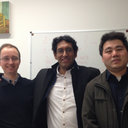Anti-sports anaemia effects of verbascoside and martynoside in mice.
Atslēgvārdi
Abstrakts
This paper aims to investigate the effects of verbascoside and martynoside isolated from PEDICULARIS DOLICHOCYMBA on sports anaemia. Forty mice were divided into four groups: Group R (control group, nonsupplemented and maintained at rest), Group E (nonsupplemented and undergoing exercise), Group VE (supplemented with verbascoside 10 mg/kg per day and undergoing exercise), and Group ME (supplemented with martynoside 10 mg/kg per day and undergoing exercise). After 5 weeks intensive swimming exercises, we measured the RBC count, the hemoglobin concentration, the hematocrit (Hct), the mean corpuscular hemoglobin concentration (MCHC) and the mean corpuscular hemoglobin (MCH). We studied the shapes of RBC and measured the plasma malonyldialdehyde (MDA). We found Group E showed lower RBC, hemoglobin and Hct levels, higher MCHC, MCH, plasma MDA levels and the abnormally shaped RBCs percentage than Groups R, VE and ME. Group ME showed lower RBC and Hct levels, higher MCH, plasma MDA levels and the abnormally shaped RBCs percentage than Group VE. The results indicated that verbascoside and martynoside have the potential of antagonizing sports anaemia, the mechanism of this effect might be related to preventing RBC from free radical damage. Moreover, verbascoside was found to be more active than martynoside.



